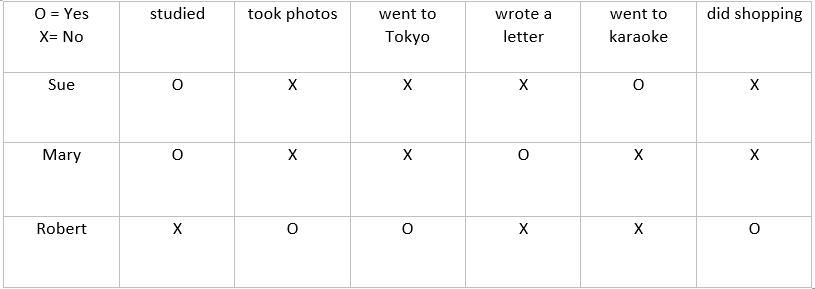Genki: An Integrated Course in Elementary Japanese Workbook I (Japanese Edition)
2nd Edition
ISBN: 9784789014410
Textbook solutions
All Solutions
Page 43: C
Exercise 1
Step 1
1 of 2
You may have already studied that the Japanese words for dates of the month or year tend to be somewhat irregular. For a complete list of these words, please refer to page 127 of your Genki I textbook.
In this recording, the teacher begins by asking their students what the date is. Robert (‘ロバート’) initially answers using a slightly incorrect form of the word for the ‘fourteenth’ of a month, and then he corrects himself. We hear that the date is ‘九月の十四日(くがつのじゅうよっか)’ so we answer ‘c.’
In this recording, the teacher begins by asking their students what the date is. Robert (‘ロバート’) initially answers using a slightly incorrect form of the word for the ‘fourteenth’ of a month, and then he corrects himself. We hear that the date is ‘九月の十四日(くがつのじゅうよっか)’ so we answer ‘c.’
Result
2 of 2
In this recording, the teacher begins by asking their students what the date is. Robert (‘ロバート’) initially answers using a slightly incorrect form of the word for the ‘fourteenth’ of a month, and then he corrects himself. We hear that the date is ‘九月の十四日(くがつのじゅうよっか)’ so we answer ‘c.’
Exercise 2
Step 1
1 of 2
You may have already studied that the Japanese words for dates tend to be somewhat irregular. For a complete list of these words, please refer to page 127 of your Genki I textbook.
In this recording, the teacher begins by asking their students what the date is. Sue (‘スー’) answers that it is ‘月曜日(げつようび)’ so we answer ‘b.’
In this recording, the teacher begins by asking their students what the date is. Sue (‘スー’) answers that it is ‘月曜日(げつようび)’ so we answer ‘b.’
Result
2 of 2
In this recording, the teacher begins by asking their students what the date is. Sue (‘スー’) answers that it is ‘月曜日(げつようび)’ so we answer ‘b.’
Exercise 3
Step 1
1 of 2

Result
2 of 2
With this question, we are tasked with tracking a large amount of information. You may need to listen to the recording several times to get the full meaning, but a good strategy is to pay special attention to key words. The students tend to answer in sequence, so it makes sense to track their answers one person at a time. From the possible answers provided, we know that we need to listen for the following:
studied ‘勉強しました(べんきょうしました)’
took photos ‘写真を撮りました(しゃしんをとりました)’
went to Tokyo ‘東京へ/に行きました(とうきょうへ/にいきました)’
wrote a letter ‘手紙を書きました(てがみをかきました)’
went to karaoke ‘カラオケへ/に行きました(カラオケへ/にいきました)’
did shopping ‘買い物をしました(かいものをしました)’
If we look out for these key words and take notes as we go, we should arrive at the answer listed in the explanation cells.
studied ‘勉強しました(べんきょうしました)’
took photos ‘写真を撮りました(しゃしんをとりました)’
went to Tokyo ‘東京へ/に行きました(とうきょうへ/にいきました)’
wrote a letter ‘手紙を書きました(てがみをかきました)’
went to karaoke ‘カラオケへ/に行きました(カラオケへ/にいきました)’
did shopping ‘買い物をしました(かいものをしました)’
If we look out for these key words and take notes as we go, we should arrive at the answer listed in the explanation cells.
unlock

